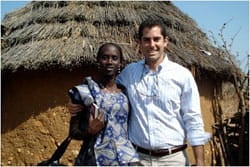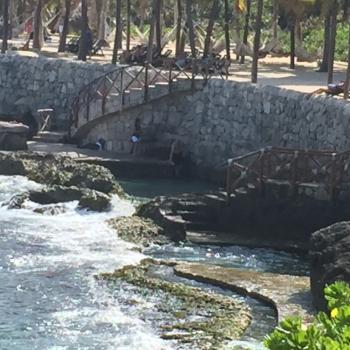 Ryan Boyette was the subject of a remarkable Nicholas Kristof profile in the New York Times for his unique work in Sudan, where he serves as a faithful witness to the ongoing war upon the Christian population in the southern reaches of the country. Greg Metzger, a friend of Patheos and an independent journalist, caught up with Ryan at a coffee shop just outside the Washington Mall. In this interview--the first of two parts--they discuss how Ryan became engaged in the fate of Sudan, and what he has witnessed there in recent months.
Ryan Boyette was the subject of a remarkable Nicholas Kristof profile in the New York Times for his unique work in Sudan, where he serves as a faithful witness to the ongoing war upon the Christian population in the southern reaches of the country. Greg Metzger, a friend of Patheos and an independent journalist, caught up with Ryan at a coffee shop just outside the Washington Mall. In this interview--the first of two parts--they discuss how Ryan became engaged in the fate of Sudan, and what he has witnessed there in recent months.
When did you first learn about Sudan? How did you end up going there?
In late 2002, my sister had read an article about Sudan. She was shocked by what she was reading about the oppression of the people of Sudan and especially the persecution of Christian populations in Sudan. She shared the article with me and I was surprised to hear about the situation because I only knew that Sudan was in Africa. That is all I knew about the country. I was surprised and worried that I had not heard about Sudan before.
I started to do some research about the lengthy civil war that had been going on there. At that time I was going through the process of becoming a United States Customs special agent, but I completely shifted my thought process. I was struggling with whether I should stay in America and live a comfortable life, or whether I should go to Sudan, where I didn't know a single person, or the language, the living conditions, nor what I would eat or if it was even possible to get there. I prayed a lot about the issue and in the end I dropped the idea of becoming a Customs Agent. By March I was determined to go to Sudan and do what I could do to help.
I started looking for organizations working in Sudan, and was introduced to Samaritan's Purse. Since it was my faith that was leading me to Sudan, Samaritan's Purse was a good fit because it is a faith-based organization. On April 27, 2003 I stepped foot on Sudan soil in the Nuba Mountains and I have been living there ever since.
Why did you resign from Samaritan's Purse and how is that connected to your marriage to Jazira?
Every year that I've lived in Nuba, my connection to the place and the people has grown stronger. The people of Nuba have become my friends and family. Many NGO workers just sit in their compound at their computers, but that just was not me. I would go visit people in their homes every day after work. We would laugh, tell stories, go to church together, go to weddings, attend funerals, take people to the hospital when they were sick and we would pray together for the future of Nuba and Sudan. Nuba became my life.
In 2007, I met my wife, Jazira. I fell in love with this beautiful and honorable woman. I was amazed by the struggle she had endured, growing up in a war zone most of her life. I really admired her commitment to God as well as her strong drive to get an education and benefit her people. After a long 4-year process we were married in February, 2011, in the local church where Jazira was raised. About 6,000 people attended the wedding.
How have things changed there since the time of your wedding?
A few months after the wedding, we started to see signs of war. Every year that I had remained in Nuba, I always asked myself, "If the war started now, would I leave or would I stay?" That question was always going through my mind.
When the fighting started in June 2011, all NGOs evacuated their staffs from the region of the Nuba Mountains and the entire Sudan state of Southern Kordofan. Samaritan's Purse asked me several times to evacuate from the region. Eventually, I resigned from Samaritan's Purse and completely decided to remain in the Nuba Mountains. I didn't feel that it was right to leave. How could I just get on a plane with my wife and leave such good friends and family behind? So Samaritan's Purse evacuated their staff and I remained at the house I had built in the village of Kauda.
Many of us have been interested in Sudan, but were under the impression that with the independence of South Sudan, things were significantly better there. What has happened in recent months that concerns you?
Well, this is where the story gets complicated. As you probably know, the southern part of Sudan had a referendum on independence from Sudan. That referendum passed and the official date for South Sudan's independence was set for July 9. Many of the soldiers who had fought for the independence of the south, the SPLA, came from the Nuba Mountain region. They were supposed to be reintegrated into the national Sudanese Army. But in the months leading up to independence, Bashir has refused to allow them entrance back into the region and has made them stay in the area that is now South Sudan. Meanwhile, he installed his ally as the Governor of Southern Kordoran, where the Nuba people live. When he did this, fighting broke out in the region, and some SPLA soldiers have come across the border to fight against the national Sudanese Army. In village after village, Bashir's forces have been committing atrocities. I have eyewitness accounts of people being pulled from their houses so their throats can be cut in front of their families. Houses were being looted and burned. Thankfully SPLA forces have regained control of many areas, and since July up till now the fighting continues but at least a front line has been established and the door-to-door killings of civilians has ceased for the moment. But there are still ground attacks on the front line every single day.




